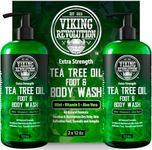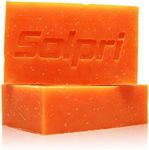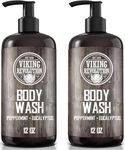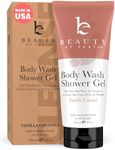Buying Guide for the Best Antifungal Soaps
Choosing the right antifungal soap can make a big difference in managing skin issues like athlete’s foot, ringworm, or general irritation caused by fungi. The best approach is to understand your skin’s needs, the severity of your symptoms, and any sensitivities you might have. Always check the ingredients and consider how often you’ll use the soap, as well as whether you need it for prevention or active treatment. Remember, if you have persistent or severe symptoms, it’s wise to consult a healthcare professional.Active IngredientsActive ingredients are the substances in the soap that actually fight fungi. Common ones include tea tree oil, ketoconazole, and clotrimazole. This spec is important because the effectiveness of the soap depends on what it contains. Some ingredients are more suitable for mild cases or prevention, while others are stronger and better for active infections. If you have sensitive skin, you might want to avoid harsh chemicals and opt for natural antifungals like tea tree oil. For more severe or persistent issues, look for soaps with medically recognized antifungal agents.
Skin Type CompatibilitySkin type compatibility refers to how well the soap matches your skin’s needs—whether you have dry, oily, sensitive, or normal skin. This is important because some antifungal soaps can be drying or irritating, especially if used frequently. Soaps for sensitive skin usually have milder formulas and fewer fragrances, while those for oily skin might include ingredients that help control excess oil. If you have dry or sensitive skin, look for moisturizing or hypoallergenic options. If your skin is oily or you sweat a lot, a stronger formula may be more effective.
Fragrance and AdditivesFragrance and additives refer to extra ingredients added for scent or texture, such as perfumes, dyes, or exfoliating beads. While these can make the soap more pleasant to use, they can also cause irritation, especially if you have sensitive skin or allergies. If you’re prone to irritation, choose fragrance-free or minimal-additive soaps. If you enjoy a pleasant scent and have no sensitivities, a lightly fragranced soap can be a good choice.
Form (Bar vs. Liquid)The form of the soap—bar or liquid—affects convenience and hygiene. Bar soaps are often longer-lasting and more eco-friendly, but can be less hygienic if shared. Liquid soaps are easier to dispense and can be more hygienic, especially in shared environments. If you travel often or share your soap, liquid might be better. If you prefer a traditional feel and want to reduce plastic use, a bar soap could be ideal.
Moisturizing PropertiesMoisturizing properties refer to whether the soap contains ingredients that help keep your skin hydrated, such as aloe vera, glycerin, or coconut oil. This is important because antifungal soaps can sometimes dry out your skin, especially with frequent use. If you have dry or sensitive skin, look for soaps with added moisturizers. If your skin is oily or you don’t have issues with dryness, this may be less important.

















